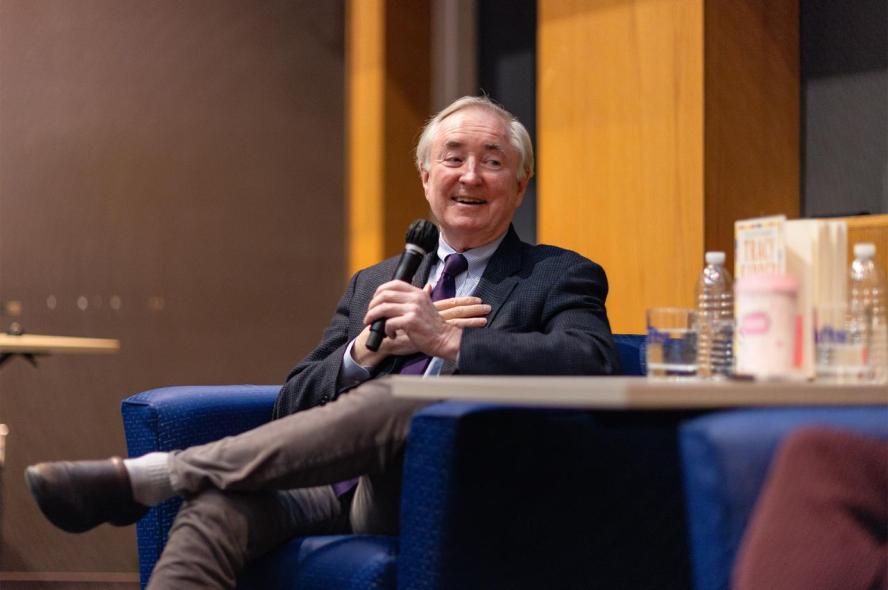-
About
- Departments & Offices
-
Academics
- Physician Assistant
- Special Master’s (MBS)
-
Admissions & Financial Aid
- Tuition & Fees
-
Student Life
-
- Student Resources by Program
- Academic & Student Support
- Wellness & Wellbeing
- Student Experience
- Events & Traditions
-
-
Research
- Research Labs & Centers
-
Local & Global Engagement
- Global Health Programs
- Community Engagement
A Lifetime of Caring for Boston’s ‘Rough Sleepers’
Public health pioneer Jim O’Connell champions kindness and continuity in treating the homeless

For 40 years, physician Jim O’Connell, the president and founder of Boston Healthcare for the Homeless (BHCHP), has treated the city’s unhoused, often working long nights from a mobile care van. When an author, Tracy Kidder, asked to write a book about his experiences, he was reluctant.
“Mostly what I was nervous about—we do a kind of intimate dance with the people we’re seeing on the street, and to bring someone around who isn’t really part of that could feel overwhelming to people, maybe almost offensive,” he said.
“What we stumbled on was that people love to have their stories told, gently and wonderfully by people who care about them,” he said. “In retrospect, we were lucky [Kidder] came by and did that.”
On November 29, the Jonathan M. Tisch College of Civic Life and Tufts University School of Medicine welcomed the trailblazing physician and subject of Kidder’s bestselling book, Rough Sleepers: Dr. Jim O'Connell's Urgent Mission to Bring Healing to Homeless People, as part of the Solomont Speaker Series.
A 2023 Common Book selection gifted to all incoming Tufts medical students, the book depicts O’Connell’s path from Harvard Medical School to the streets of Boston after dark, where he has been a primary care provider and, most often, a friend.
Throughout the event, in which he was interviewed by his street team colleague and Presidential Award for Civic Life winner Becky Lee, M17, O’Connell deflected credit, praising others for BHCHP’s impact.
Begun as a small, grant-funded group in 1985, the program now consists of 600 medical and behavioral staff and serves more than 10,000 homeless patients a year. Dedicated bands of nurses and doctors, including O’Connell and Lee, continue to make nighttime clinical rounds in Boston, offering medical care, food, clothing, blankets, and perhaps most importantly, kindness.
The following are highlights from their conversation.
Consistency is a priority.
When BHCHP was forming, O’Connell remembered, homeless people on its board said that most health care workers they encountered only spent a few months or a year working with the unhoused before moving on. “And their point was, ‘Why does no one ever stick with us? … Most of our lives are marked by fragmentation and loss, and the last thing we want is a bunch of different people coming to take care of us.’”
That led to the program focusing on continuity of care by dedicated staff. “It all came from that feisty group of people back in the winter of ’84, who insisted that our program be one of social justice,” he said.
The homeless need a full range of care.
Drug overdose is the cause of death in about a quarter of fatalities among homeless people, O’Connell said. “But the other three quarters are dying from cancer, and then its heart disease, lung disease, and liver disease. So it’s real medical stuff.”
“We can’t take good care of people unless the cancer units, the pulmonary units, and the infectious disease folks are willing to work with us. It’s really critical,” he said. “Specialists who are willing to forgive someone for not showing up right on time, who are willing to work with us and follow up, have become like a godsend.”
Ending homelessness will take a multipronged approach.
“It’s only going to be done when we can scale up housing, when we fix our schools, our correction system, and our welfare system. It’s going to be a mosaic of solutions to this problem,” O’Connell said. “That said, there are a whole bunch of people who are chronically out there, and we need to take care of them. It’s not either/or. It’s this/and. We need to do both.”
Treating the homeless can quickly lead to burnout, but there is an antidote.
With two years of experience on the BHCHP team, Lee invoked the myth of Sisyphus in confessing to feelings of helplessness. “We are working downstream from this giant problem of homelessness, and it does feel like this endless mountain,” Lee said.
O’ Connell agreed, but recalled the words of Barbara McInnis, a teacher, public health nurse, and former mentor of his. “Barbara used to say, ‘‘Who do you think you are? You’re just the doctor. You can’t change society, but you can take care of people. Your job is to really listen to them and take care of them even though you may not be able to change where they live.’ So I’ve tried to hang onto that.”
The soft-spoken doctor, who studied philosophy as an undergraduate, impressed upon his young mentee and the many aspiring physicians in the room the true reward of treating those he termed “radically free.”
“The longer you get to know people, I can promise you, as their stories unfold, they turn out to be leading lives of really quiet courage and heroism, against unbelievable odds,” he said. “When you get involved in their care, that’s what sustains us.”